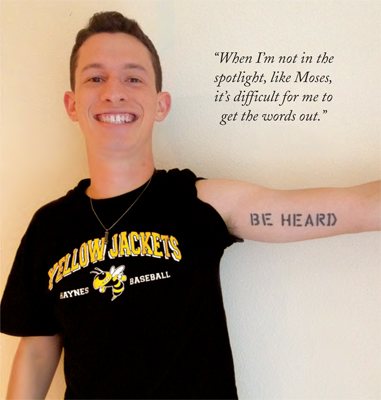
When I’m songleading at the URJ’s Henry S. Jacobs Camp in Utica, Mississippi, my speech impediment is not evident. But when I’m not in the spotlight, like Moses, it’s difficult for me to get the words out.
I’ve got a tattoo on the inside of my left bicep that reads: “BE HEARD.” It’s on the left side, because that side of the brain controls speech, and each letter has spaces within it, because that is just like I speak…all broken up.
In essence, the tattoo reminds me that, no matter how afraid I am, I must speak up and be heard.
Growing up, because I was surrounded by a supportive family and community, I never thought much of my stutter. That changed in my freshman year of college, when people taking my order in the student union or at a drive thru would laugh at me. I started feeling very alone and depressed.
Then I heard about a boy my age who had killed himself because he couldn’t take living with his stutter anymore. This snapped me out of my funk. And it made me want to have a reminder—a tattoo—for me to speak up and not let other people bring me down.
Today I believe the tattoo has helped me become a better song leader. I’m more self-confident, which shows when I’m leading a camp or congregation in song. I’ve also become more open to talking to strangers about my speech. People ask me about the tattoo, and almost universally they like the meaning and my willingness to wear my disability on my sleeve. It gives me a chance to educate people I wouldn’t normally speak to.
Nick May, 20, is a songleader at URJ Henry S. Jacobs Camp in Utica, Mississippi.

